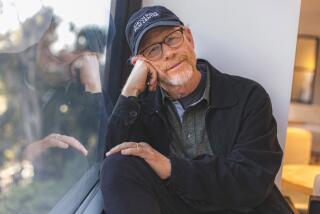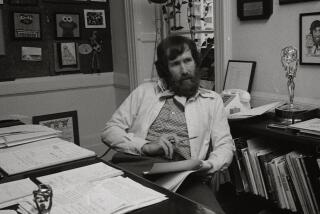Ready to rock like it did before
Though you may not believe it to look at them now, premium cable networks used to take an active interest in programming for young people. Nowadays, of course, they’re more concerned with talking dirty and getting women naked, but once upon a time, Shelley Duvall’s “Faerie Tale Theatre” was the single best reason to subscribe to Showtime and HBO was home for five seasons to Jim Henson’s “Fraggle Rock.”
All 96 episodes of “Fraggle Rock” were recently collected, with a documentary bonus disc for each season, in a 25th anniversary DVD edition. Like all Henson productions, the series is something for the whole family, not because it’s studiously inoffensive, but by its being unrelentingly smart. (The writing staff -- not made up wholly of children’s TV professionals -- included poets, a novelist and a playwright.) Most of the episodes do contain some lesson about personal behavior or social interaction, contained within a larger idea about the often unacknowledged interdependence of species. (Much as you may regard the bees, say, whose work affects you though you might never think to thank them.)
With their feather-boa hair and Muppet-brand Ping-Pong-ball eyes, the Fraggles are a society of the young at heart, who work and play in inverse relation to humankind. As their Venerable and Eminent Council of Sages sings, “When there’s trouble on the Rock / Do we hold our heads in shock? (No!) / We hold each other’s noses and we hum.” (There are a couple of original songs in every episode; nothing as evergreen as “Rubber Duckie” or “It’s Not Easy Being Green,” but generally good stuff.) Still, they aren’t immune to worry or fear, and they make plenty of mistakes about each other, about their cave-and-tunnel world and about the world beyond them.
Their closest neighbors are the Doozers, a race of tiny construction workers whose radio-controlled movements make them look weirdly alive, and whose spun-sugar Tinkertoy constructions the Fraggles eat. Dwarfing the Fraggles are the Gorgs, troll-types whose entire race is represented by a king, a queen and their Fraggle-catching son, whom they lovingly subjugate. In their garden resides Marjory, the Trash Heap, an oracular pile of garbage with a bit of a Yiddish accent: “I’m orange peel, I’m coffee grounds, I’m wisdom.” (She “knows all, because she is all.”) She sings the blues about her constituent parts: “It may be garbage, but it sure ain’t junk.”
And there are humans whom the Fraggle called Traveling Matt (a pun on a special-effects term) encounters when he finds a hole leading to “outer space” -- that is, to the surface of the Earth -- via the workshop of less-than-brilliant inventor Doc (Gerard Parkes) and his beautifully performed Muppet dog, Sprocket. Matt finds them “silly creatures,” in part because he regards anything that moves or makes a noise as a sentient being (teakettles, cars, telephones).
The show concentrates on five Fraggle friends: Gobo (whose Canadian accent is the most obvious effect of the show’s having been made in Toronto), the nephew of Traveling Matt and a bit of an explorer himself; Red, more or less his female counterpart; arty, hippie-ish Mokey; indecisive Wembley, so anxious to please he lets himself be used as a clothesline; and Boober, whose depressive personality stands in stark contrast to his fellow Fraggles.
Much of the show revolves around understanding one’s own nature and place in the world but also not letting others define you.
There is a “Fraggle Rock” movie coming (filming starts next year), which may be bigger but will not be any better than these 48 hours, now available in a single box.
--
More to Read
The complete guide to home viewing
Get Screen Gab for everything about the TV shows and streaming movies everyone’s talking about.
You may occasionally receive promotional content from the Los Angeles Times.







